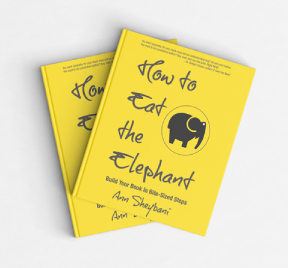Writing
How to write a (prescriptive) non-fiction book introduction
September 18, 2023
The introduction to your non-fiction book is your chance to make a good impression on potential readers and convince them to keep reading. We’re all busy people, so we need to know, straight out of the gate, that our precious time will not be wasted.
These first few pages are where you’ll introduce your topic, explain why it’s important, and give readers a preview of what they’ll learn in the rest of the book.
Here are some key things to include in your introduction:
Grab the reader’s attention. The first few sentences of your introduction should be strong and engaging, so that readers want to keep reading. You can do this by telling a story (my favorite method), asking a question, or sharing a surprising fact. For instance: According to a study by Author Marketing Club, only 3% of people who start writing a book actually finish it. (Bet that got you to sit up!)
Introduce your topic. What is your book about? Managing anxiety in the workplace? Starting a business with $100? Saving your child from addiction? Why is the topic important? What new knowledge or insights will readers gain from reading it?
Give us a clear problem the reader will fess up to: We need a clear problem that is being addressed and solved. What does it feel like for a person to have this problem in a very visceral way? How is this problem not about personal failings, but a societal issue? How can we make it OK for our reader to fess up to having this problem so they can address it, not pretend they don’t have it? What kind of social proof can you offer? Statistics, a reference to other experts, scientific studies that expand on this. So we know that this is a common issue.
Give us an enemy or a myth that must be debunked: What is the mistaken thinking that has gotten the reader into hot water? What do they believe needs to be turned around so they can fix the problem? What do they, wrongly, think is the solution?
Offer us your thesis statement. A thesis statement is a concise statement that expresses the main argument or claim of your book. A good thesis statement is clear, concise, and arguable, meaning that it should be a statement that people could disagree with. It should also be supported by the evidence presented in the book.
Here are some examples of good (arguable) thesis statements for non-fiction books:
- Children should have an equal say in all family decisions to reduce their need to act out.
- You will save yourself years if you commit to writing a first shitty draft instead of trying to write the perfect book in one go.
- Climate change is a real and urgent threat to our planet, and it is caused by animal product consumption.
- Yo-yo dieters are food addicts.
Establish your credibility. Why are you the right person to write this book? What expertise or experience do you have on the topic? If you have both personal and professional experience, all the better. If you were your own first client, then used your methodology to help hundreds of other people to overcome the problem that you address, well, we want to know about this right here. Why are you the person who not only gets it, but has the solution, has fought to figure out a solution? Have you developed a system to fix this problem? How did it come about?
Outline the structure of your book. Is the book comprised of short readable chapters? Is it divided into three main sections? Does each chapter contain exercises that the reader can do along the way? What will readers learn in each chapter?
Clarify the outcome. What are the main takeaways from the book? By the time they finish reading this book, how will the reader’s life be different? How will their life improve physically, finically, emotionally, and spiritually?
To help you organize your thoughts so you can dive into your first draft, here are a few questions to consider:
- Who are you (the author) and why are you the person who not only gets it, but has the solution, has fought to figure out a solution?
- What does it feel like for a person to have this problem in a very visceral way? How is this problem not about personal failings, but a societal issue? How can we make it OK for our reader to fess up to having this problem so they can address it, not pretend they don’t have it?
- What kind of social proof can you offer? Statistics, a reference to other experts, scientific studies that expand on this. So we know that this is a common issue.
- What is the mistaken thinking that has got the reader into hot water? What do they believe that needs to be turned around so they can fix the problem? What do they, wrongly, think is the solution?
- Have you developed a system to fix this problem? How did it come about?
- What are you going to teach them?
- What polarizing statement do you mean to support with your book? What will other experts in your field likely disagree with?
- By the time they finish reading this book, how will the reader’s life be different? How will their life improve physically, finically, emotionally, and spiritually?



[…] Restate your thesis or main message: Begin your conclusion by revisiting the main point or argument you made in your introduction. This reminds your readers of the central focus of your piece. (If you don’t know what I’m referring to, go HERE.) […]
[…] Restate your thesis or main message: Begin your conclusion by revisiting the main point or argument you made in your introduction. This reminds your readers of the central focus of your piece. (If you don’t know what I’m referring to, go HERE.) […]